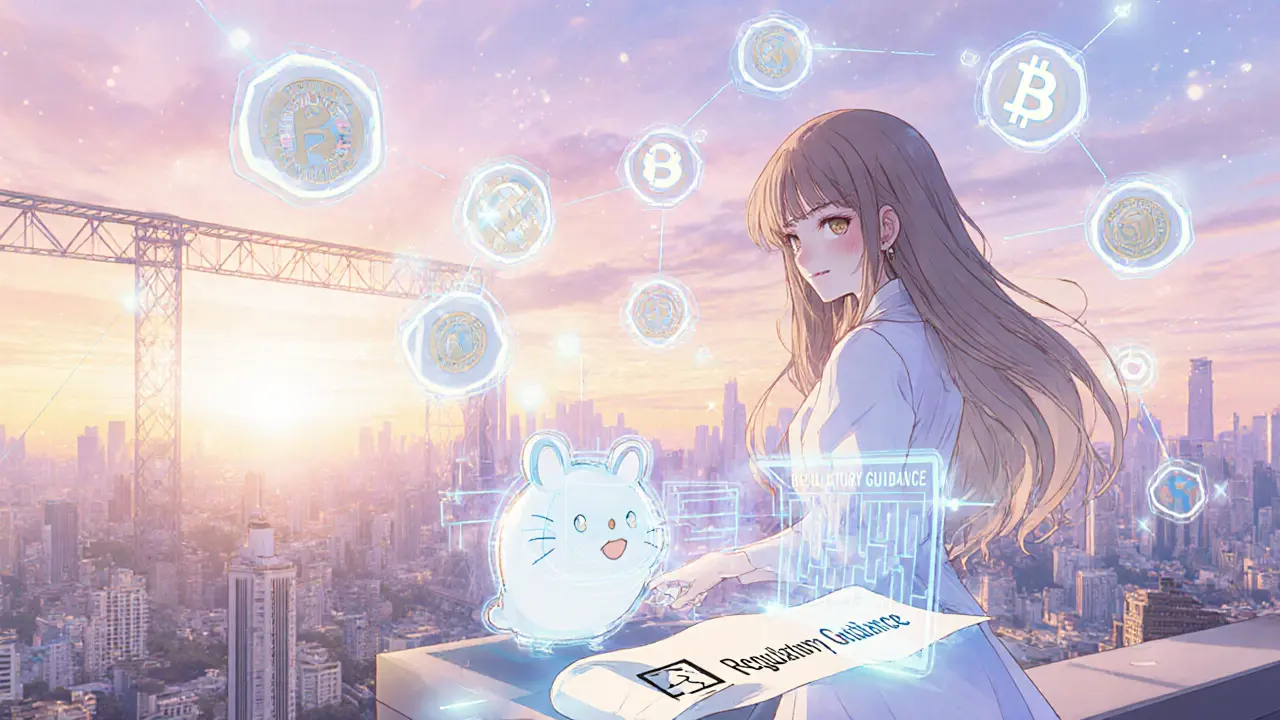What the Future Holds for Decentralized Governance Tokens
 Oct, 6 2025
Oct, 6 2025
Governance Token Voting Simulator
Simulate Voting Power Distribution
This tool demonstrates how different voting mechanisms distribute influence among token holders. Enter your token holdings and select a mechanism below.
Simulation Results
Your simulated voting power will appear here after running the simulation.
Imagine a world where anyone with an internet connection can help steer the rules of a financial protocol, a NFT marketplace, or even a social network. That vision is already happening thanks to decentralized governance tokens, but the next few years will reshape how those tokens work, who wields influence, and what value they create.
Key Takeaways
- Governance tokens are evolving from simple vote‑weight tools to multi‑modal decision engines that blend token voting, quadratic mechanisms, and AI assistance.
- Delegated voting and reputation‑based systems are curbing low voter turnout and the risk of plutocratic control.
- AI agents are emerging as delegators, proposal writers, and risk analyzers, making participation easier for non‑technical holders.
- Cross‑chain tooling and sophisticated dashboards (e.g., Tally, Agora) are lowering the technical barrier for DAO members.
- Regulatory uncertainty and smart‑contract security remain the biggest headwinds for mainstream adoption.
What Is a Governance Token?
When we talk about governance token is a cryptographic asset that grants holders voting rights over protocol decisions in a blockchain network, we’re describing a new class of digital asset that blends finance with governance. Unlike Bitcoin, whose primary purpose is value transfer, governance tokens let holders influence parameters such as fee structures, upgrade paths, and treasury allocations.
Two flagship examples illustrate the model:
- MakerDAO's MKR is a token that enables voting on DAI’s stability fees, collateral types, and risk parameters, directly shaping the stablecoin’s monetary policy.
- Uniswap's UNI is a governance token that lets the community decide on liquidity incentives, protocol upgrades, and grant programs.
These tokens act as both a financial stake and a lever for collective decision‑making, creating a feedback loop where better governance can boost token value.
Emerging Voting Mechanisms
Pure token‑weight voting is simple but vulnerable to concentration of power. To address this, projects are experimenting with a toolbox of mechanisms.
- Quadratic voting is a system where each additional vote costs exponentially more tokens, limiting the influence of large holders.
- Delegated voting lets token owners assign their voting power to trusted representatives, improving participation rates.
- Reputation‑based voting rewards active contributors with influence, decoupling power from sheer token balance.
- Conviction voting accumulates voting weight over time, allowing slow‑burning support to surface.
- Holographic consensus (used by DAOstack) blends reputation, token stakes, and dynamic quorum thresholds.
Many DAOs combine two or more of these models, creating hybrid systems that balance efficiency with fairness.

AI Integration - The Next Governance Layer
2025 is the year AI moves from analytics to agency in DAO ecosystems. a16z Crypto outlines six trends, with AI delegation at the forefront.
- AI‑assisted delegate matching: Platforms scan voting histories, forum posts, and proposal outcomes to recommend delegates whose values align with a holder’s preferences.
- AI delegates: Experimental agents act on behalf of principals, voting, commenting, and even proposing new initiatives based on predefined risk parameters.
- Proposal summarizers: Natural‑language models condense lengthy governance drafts into digestible bullet points, reducing information overload.
- Sybil detection: Machine‑learning classifiers flag coordinated voting attacks before they affect outcomes.
While fully autonomous AI voters are still in the lab, early adopters report a 30% lift in voter turnout on platforms that surface AI‑generated summaries.
Market Trends and Institutional Interest
Governance tokens are no longer niche curiosities. Rapid Innovation’s 2025 DeFi trends report shows a 45% year‑over‑year increase in token‑based treasury allocations across major protocols. Institutional players are buying into governance as a risk‑management tool: by holding a token, they gain a seat at the table for protocol upgrades that could affect their on‑chain exposure.
Cross‑chain bridges now support voting across multiple layers, allowing a token holder on Ethereum to influence a Polygon‑based DAO without moving assets. This interoperability is accelerating the convergence of DeFi, NFT marketplaces, and social‑network DAOs.
Challenges and Risks
Low voter participation remains the most cited weakness. Nadcab’s 2024 study found that only 12% of token holders vote on any given proposal, leaving decisions to a vocal minority.
Security is another sore spot. A single smart‑contract bug in a governance module can freeze millions of dollars, as seen in the 2023 DAO hack that erased $150M from a treasury. Audits and formal verification are becoming mandatory for high‑value token contracts.
Legal ambiguity also looms. Some jurisdictions treat governance tokens as securities, exposing holders to compliance requirements they didn’t anticipate.

Outlook: 2025 and Beyond
Looking ahead, three forces will shape the trajectory:
- Hybrid voting models: Expect more DAOs to adopt layered systems-quadratic voting for budget decisions, delegated voting for technical upgrades, and reputation scoring for community grants.
- AI‑driven participation: By 2027, AI assistants will be standard tools on platforms like Tally and Agora, handling proposal summarization, risk analysis, and delegate recommendation.
- Regulatory clarity: As governments publish guidance on token‑based governance, compliant DAOs will attract larger institutional capital, further legitimizing the model.
In short, governance tokens are morphing from simple vote‑weight holders into sophisticated infrastructure that links economic incentives, technical upgrades, and community values.
Comparison of Popular Voting Mechanisms
| Mechanism | How Influence Is Measured | Pros | Cons |
|---|---|---|---|
| Token‑Weight | Number of tokens held | Simple, transparent | Prone to plutocracy, low diversity |
| Quadratic Voting | Square‑root of tokens spent per vote | Reduces big‑holder dominance | Higher cognitive load for voters |
| Delegated Voting | Votes assigned to a delegate | Boosts participation, expertise | Risk of delegate capture |
| Reputation‑Based | Activity‑earned reputation points | Rewards contribution | Subjective reputation metrics |
| Conviction Voting | Accumulated voting weight over time | Highlights long‑term support | Slower decision cycles |
Frequently Asked Questions
What exactly can a governance token do?
A governance token lets its holder vote on protocol upgrades, fee changes, treasury allocations, and sometimes even on‑chain policy decisions like collateral types. The token also often accrues economic value, so voting power and financial upside go hand‑in‑hand.
Why is voter turnout so low?
Most holders lack the time or technical expertise to read long proposals. Without user‑friendly dashboards or AI summarizers, the voting process feels daunting, leading many to simply ignore it.
Can I delegate my votes safely?
Yes, platforms like Tally and Agora let you assign voting power to a delegate you trust. Look for delegates with transparent performance metrics and a clear revocation process.
How does AI help with governance?
AI can summarize proposals, flag risky voting patterns, recommend delegates, and even draft new proposals based on community sentiment. It reduces the cognitive load and speeds up decision‑making.
Are governance tokens regulated?
Regulation varies by jurisdiction. Some countries view them as securities if they convey economic rights, while others treat them as utility tokens. Always check local guidelines before participating.

Kimberly Kempken
October 6, 2025 AT 08:20Enough with the techno‑utopian hype – governance tokens are nothing more than a glorified Ponzi scheme dressed up in smart‑contract veneer. The so‑called “quadratic voting” is just a gimmick to pretend fairness while still letting whales tip the scales. You’ll see the same concentration of power, only hidden behind AI‑generated summaries that mask the fact that a handful of delegates still call the shots. And don’t even get me started on the legal minefield; regulators will soon slap a securities label on every token that claims voting rights, turning the whole experiment into a courtroom drama. In short, the future you envision is a fantasy built on fragile code and fragile egos.
Eva Lee
October 13, 2025 AT 17:21While I acknowledge your skepticism, the emergent meta‑governance layer leverages ontological tokenomics to reconcile epistemic asymmetries. By integrating Byzantine fault‑tolerant consensus with delegative proxy networks, the protocol minimizes Sybil vectors while scaling decision throughput. The cross‑chain interoperability stack-comprising rollup aggregators and zk‑proof bridges-further dilutes concentration effects by abstracting asset locality. Hence, the architectural heterodoxy you dismiss actually constitutes a resilience buffer against centralization pressures.
Carthach Ó Maonaigh
October 21, 2025 AT 02:22Holy crap, this article reads like a buzzword soup commercial for a crypto‑powered sci‑fi movie. Quadratic voting? Sure, if you enjoy turning math class into a political circus. Delegates sound great until you realize they’re just the old guard in new clothes, whispering sweet nothings to the token‑rich elite. And AI “assistants”? More like glorified spam bots that regurgitate white‑paper fluff while pretending to be helpful. Bottom line: we’re trading real governance for a veneer of participation.
Brooklyn O'Neill
October 28, 2025 AT 10:23Hey folks, let’s take a breath and remember that every experiment starts messy. The community has already built some solid mentorship programs where experienced delegates walk newbies through proposal reviews, which really helps lower the barrier. If we pool our knowledge and keep the conversation inclusive, those AI tools can become allies rather than dictators. Together we can steer the ship toward genuine decentralization.
Greer Pitts
November 4, 2025 AT 19:24Wow, this is super exciting! I love how the piece shows that even folks like me, who barely get a crypto wallet, can actually have a say in the future of protocols. The idea of AI summarizers sounds like a game‑changer – no more wading through dense docs. Keep the optimism flowing, guys!
Lurline Wiese
November 12, 2025 AT 04:25Hold up, drama alert! 🌟 The moment we start relying on AI to “summarize” proposals, we might as well hand the reins over to Terminator. Sure, it sounds slick, but remember the last time a bot tried to predict market moves? Total chaos. Let’s not turn the DAO into a Hollywood screenplay where the AI steals the show.
Jenise Williams-Green
November 19, 2025 AT 13:26We cannot ignore the moral imperative behind decentralized governance. When token holders wield real economic power, they also inherit a duty to act in the collective’s best interest, not just chase personal profit. Any system that allows a few rich actors to dominate decision‑making betrays the very ethos of fairness and equality that the blockchain promises. Hence, the push toward quadratic and reputation‑based models is not merely technical tinkering-it’s a pursuit of ethical stewardship.
Laurie Kathiari
November 26, 2025 AT 22:27Honestly, your high‑moralizing tone feels a bit sanctimonious. While you preach ethics, you conveniently overlook that many “reputation” scores are gamified and can be bought with marketing budgets. The so‑called “ethical upgrade” often ends up being a veneer for the same plutocratic dynamics you decry. So before you crown these models as saviors, examine who actually controls the reputation algorithms.
Cynthia Rice
December 4, 2025 AT 07:28In the end, governance is a mirror reflecting the collective will of its participants.
Katherine Sparks
December 11, 2025 AT 16:29Dear community, I wholeheartedly agree with the sentiment expressed above. Your insights illuminate the path forward, and I am confident that together we shall cultivate a vibrant and inclusive ecosystem. Let us continue to support each other's growth and celebrate every milestone, no matter how small. Keep up the great work! :)
Ciaran Byrne
December 19, 2025 AT 01:30Remember to always verify the DAO’s voting contract code before delegating – a simple audit can prevent costly mishaps.
Adarsh Menon
December 26, 2025 AT 10:31Oh sure, because throwing a few commas in a smart contract magically makes it bulletproof. Next we’ll be handing out cape and tights to every delegate and expecting them to fly. Real talk: security audits aren’t optional, they’re the only thing keeping our dreams from crashing.
Promise Usoh
January 2, 2026 AT 19:32It is evident that the trajectory of decentralized governance tokens is intrinsically linked to the evolution of collective rationality within digital societies. As we observe an incremental shift from pure token‑weight mechanisms toward hybrid models, we must acknowledge the epistemic limitations inherent in any single‑dimensional voting schema. The integration of AI‑driven analytic layers offers a promising avenue to surmount these constraints, albeit not without introducing new vectors of algorithmmic bias. Consequently, the discourse must remain vigilant, balancing innovation with prudence, lest we sacrifice the foundational principles of transparency and autonomy upon the altar of technological sophistication.
Scott McReynolds
January 10, 2026 AT 04:33It's truly inspiring to witness the community's relentless drive to refine governance structures, and I believe this momentum will carry us into a new era of digital self‑determination. First, we must celebrate the incremental adoption of hybrid voting models, which combine the simplicity of token‑weight with the equity of quadratic mechanisms. Second, the emergence of AI‑assisted delegates represents a paradigm shift, allowing even the most novice participants to engage meaningfully without being overwhelmed by technical minutiae. Third, cross‑chain interoperability is breaking down silos, enabling token holders to influence proposals across multiple ecosystems with a single, unified interface. Moreover, the growing emphasis on formal security audits ensures that the underlying smart contracts remain robust against adversarial attacks, preserving trust in the system. While regulatory frameworks are still catching up, proactive compliance can position DAOs as responsible actors in the broader financial landscape. Educational initiatives, such as mentorship programs and community workshops, further democratize access to governance knowledge. By fostering an inclusive culture where diverse perspectives are heard, we mitigate the risks of echo chambers and groupthink. Additionally, transparent reporting of voting outcomes builds accountability, reinforcing the principle that power must be answerable to its constituents. As we look ahead, the synergistic integration of reputation‑based incentives and conviction voting can capture both short‑term enthusiasm and long‑term commitment, balancing agility with stability. It is essential, however, to remain vigilant against the centralizing temptations that AI delegation could inadvertently introduce. Continuous community oversight, coupled with open‑source development, creates a feedback loop that corrects course when needed. In sum, the confluence of technological innovation, thoughtful design, and collective stewardship augurs a future where decentralized governance is not just a buzzword but a lived reality for millions. Let us maintain this optimistic trajectory, celebrating each breakthrough while learning from every setback, because the journey toward truly equitable digital governance has only just begun.